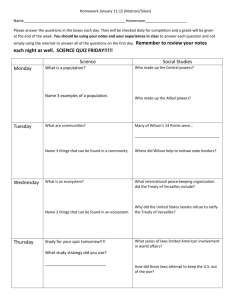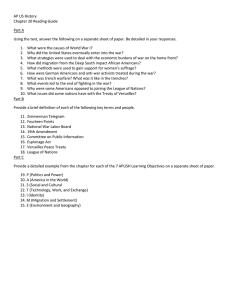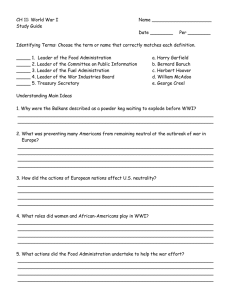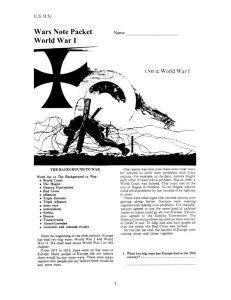Chapter 21- World War I WORLD WAR I –
advertisement
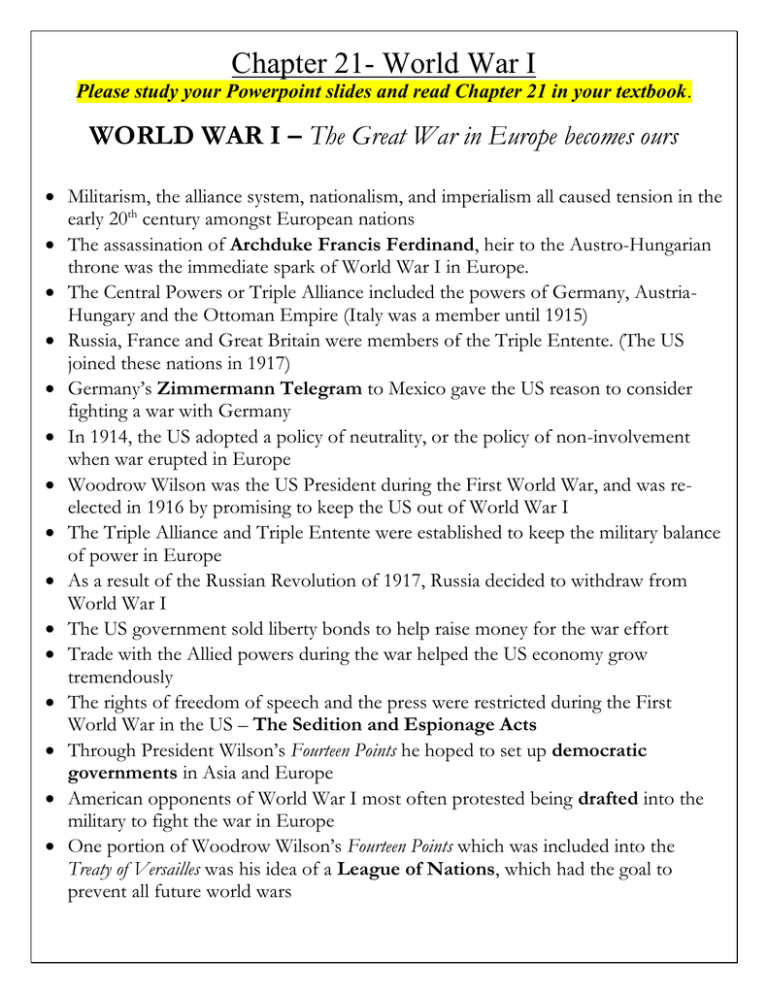
Chapter 21- World War I Please study your Powerpoint slides and read Chapter 21 in your textbook. WORLD WAR I – The Great War in Europe becomes ours Militarism, the alliance system, nationalism, and imperialism all caused tension in the early 20th century amongst European nations The assassination of Archduke Francis Ferdinand, heir to the Austro-Hungarian throne was the immediate spark of World War I in Europe. The Central Powers or Triple Alliance included the powers of Germany, AustriaHungary and the Ottoman Empire (Italy was a member until 1915) Russia, France and Great Britain were members of the Triple Entente. (The US joined these nations in 1917) Germany’s Zimmermann Telegram to Mexico gave the US reason to consider fighting a war with Germany In 1914, the US adopted a policy of neutrality, or the policy of non-involvement when war erupted in Europe Woodrow Wilson was the US President during the First World War, and was reelected in 1916 by promising to keep the US out of World War I The Triple Alliance and Triple Entente were established to keep the military balance of power in Europe As a result of the Russian Revolution of 1917, Russia decided to withdraw from World War I The US government sold liberty bonds to help raise money for the war effort Trade with the Allied powers during the war helped the US economy grow tremendously The rights of freedom of speech and the press were restricted during the First World War in the US – The Sedition and Espionage Acts Through President Wilson’s Fourteen Points he hoped to set up democratic governments in Asia and Europe American opponents of World War I most often protested being drafted into the military to fight the war in Europe One portion of Woodrow Wilson’s Fourteen Points which was included into the Treaty of Versailles was his idea of a League of Nations, which had the goal to prevent all future world wars The US did not join the League of Nations because the US Senate refused to ratify (pass) the Treaty of Versailles The US Senate did not want the US to be dragged into any future European wars, which the League of Nations would pledge to protect The Supreme Court of the US ruled in the case, Schenck vs. US, that free speech can be restricted and limited if it creates a clear and present danger to the US (as in times of war) The status of women changed during the war because with the absence of men greater job opportunities were suddenly available for women A blockade is an attempt by a country to stop all types of shipping from entering another country’s harbors or ports France, Britain, Italy, and the US were known as the Allied Powers The Zimmerman Note was a German message sent to Mexico trying to lure Mexico into the war on the side of Germany by attacking the US The Sedition and Espionage Acts were laws which tried to limit opposition to the war by placing opponents in jail Reparations are payments made by one nation to another for damages caused by a war The Selective Service Act required all men between the ages of 18 – 45 to register for the draft The nations of Germany, Austria-Hungary, and the Ottoman Empire were known as the Central Powers due to their location in Europe Trench Warfare was developed to try to combat the use of machine guns and other devastating weapons Woodrow Wilson’s idea for a League of Nations was a peace making body whose goal was to avoid future war through discussion The proceedings at the Versailles peace conference would have real important consequences on the events of Europe in the decades to come. (1930’s and 1940’s) The terms of the Treaty of Versailles would cause resentment and bitter feelings amongst the defeated nation of Germany.


